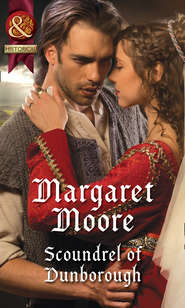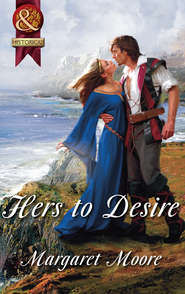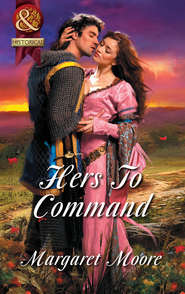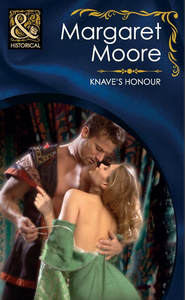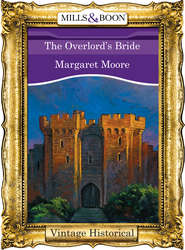По всем вопросам обращайтесь на: info@litportal.ru
(©) 2003-2025.
✖
The Welshman's Bride
Настройки чтения
Размер шрифта
Высота строк
Поля
“I honestly don’t know,” Lady Roanna replied. “But he does seem very determined to do it.” She leaned forward, her gaze searching Genevieve’s face. “What I must know is, do you want to be his wife? If you do not, tell me. Neither my husband nor I believe in forced marriages.”
A strange look crossed Lady Roanna’s face. “For very good reasons. So, if you would rather not marry Dylan, just say so and it will not be.”
“My uncle threatens to send me away to a remote convent if I do not,” Genevieve replied warily.
“We would convince him otherwise.”
Despite Lady Roanna’s calm conviction, Genevieve found it difficult to believe they would be able to change her stubborn uncle’s mind.
So now it was up to her to decide: marry Dylan DeLanyea, who only hours ago had made it very clear that he did not want her for his wife.
Or be sent to a convent, forever unmarried and childless.
Chapter Four
Somewhere in the dim recesses of Dylan’s mind, he had always known he would marry one day. He had, however, envisioned doing so under distinctly different circumstances.
Whenever he had taken a moment to contemplate his future spouse, for example, he had pictured a spirited Welsh woman of voluptuous build who would understand about his children and the women who had borne them.
He had certainly never imagined himself married to a pale, blond girl-woman of Norman blood, especially one who had tricked her way into his bed, he reflected as he stood in the hall with his relatives, along with the baron’s assembled guests and the castle servants.
They were all awaiting the arrival of his bride and the blessing of a priest hastily summoned.
He had also naturally assumed he would be passionately in love with his bride, a passion beyond anything he had ever felt for the many and various women who had already shared his affection and his bed.
Genevieve Perronet was attractive, of course, and she had been arousing—but he did not love her. Anwyl, he hardly knew her.
And therein, of course, lay the biggest problem. Angry and frustrated, he had proposed a marriage with scarcely a thought of the bride-to-be, his primary motive being to annoy her haughty, pompous uncle.
At least Genevieve would be pleased, he consoled himself, his natural optimism reasserting itself. She would be grateful that he was marrying her and saving her damaged honor.
And she had said she loved him.
A grateful, loving wife with a dowry of five hundred gold coins was not something to be dismissed out of hand. As for his children, he would simply have to explain to her that the Welsh were not so hypocritical when it came to illegitimate children. In Welsh eyes, a child was a child, whether born in wedlock or not.
If he and Genevieve had a son, that firstborn son would inherit Beaufort according to Norman law. Trefor, his eldest son out of wedlock, would be given his own land out of that estate, as would his other bastard son, Arthur, equal to that of any subsequent issue.
Genevieve would simply have to accept that.
The baron, standing beside him, shifted, drawing Dylan’s attention from his own musings. Glancing around the hall, Dylan realized the guests and servants were exchanging wary glances.
“Brides are often late,” the baron muttered. “Wanting to look their best, is all. You know how women are.”
Dylan nodded. Yes, he knew women, and so he would be patient. “Will Lady Roanna be here for the blessing?”
“Old Mamaeth is very bad but—” the baron started to explain when suddenly there was a commotion at the entrance to the hall.
Dylan found himself holding his breath, then, when he saw the reason for the disturbance, letting it out slowly.
It was Lady Roanna and the baron’s old nurse, who was being carried in, seated on a chair borne by two brawny servants as if she were an Oriental potentate.
“Not missing this,” the elderly woman chirped cheerfully. “It’s about time that young devil settled down and got married and quit sowing his seed all over Wales.”
Dylan tried to smile. He was happy Mamaeth had made the effort to see him wed, of course, and happier yet to see Lady Roanna, who was like a mother to him.
But Mamaeth had a tongue that wagged, especially when she was in a celebratory mood, and no sense of propriety at all.
Which she proceeded to demonstrate.
“Where’s the bride?” she demanded querulously. “Not changed her mind, I hope, after all the uproar! Nearly stopped my heart, that.”
The people in the hall smiled, but the smiles were a little strained.
“It is a good thing she is taking her time,” Dy-lan replied with a merriment he didn’t quite feel. “Otherwise you would have been late.”
“Humph!” was all the answer Mamaeth could think to make to that before she subsided into an uncharacteristic silence, and for that, Dylan was grateful.
“Ah, here they are!” the baron cried softly.
Again Dylan looked at the entrance to the hall—and then gasped with delight.
Genevieve wore a gown of white silk whose long cuffs, lined with gold samite, reached nearly to the floor. Over this was a tunic, also of gold. Her girdle of gold and silver embroidery encircled her slender waist, crossed in back and was knotted again in front, so that it fell low on her hips.
Her hand on her stern uncle’s arm, she slowly approached the group waiting on the dais, and as she did, her low-slung girdle seemed to highlight the graceful sensuality of her walk.
Surprisingly aroused, especially given the crowd surrounding him, Dylan swallowed hard and forced himself to look at her face. On her head was a stiffened band with matching embroidery held in place by a white silken scarf that passed from one side of the crown under her chin to the other.
Without the cluster of golden curls that usually surrounded her face, she looked older, and more womanly.
His heart beat faster.
Then she came near enough for him to get a good look at her expression.
Rarely had he ever seen anyone, including Griffydd, appear so grimly resolute. She looked more like a condemned prisoner being led to the block than a woman who had connived to bring about her own marriage.
If she did not want to be married to him, why was she there?
Confused, and with his pride wounded—for never had he imagined his bride would have such a look on her face—he glanced at Lady Roanna He knew she had spoken with Genevieve. Perhaps Genevieve had given his foster mother some inkling...?
Lady Roanna smiled tranquilly, as if this were nothing more than a joyous occasion and she glad to be there.
Surely she would not look so calm if she thought there was trouble in the offing.
Next, Dylan glanced at the baron, who had a somewhat troubled frown on his face, and his sons likewise.
Dylan grew aware of the puzzled murmurs of the assembly, and the various expressions of the guests, who generally seemed to be regarding him with a certain questioning gravity, and Genevieve with...pity?
Anwyl, this was her doing. Her fault. The result of her scheming and trickery. He would have no one think this was being forced on her!






